Reason to Believe 10
Chris Knepp
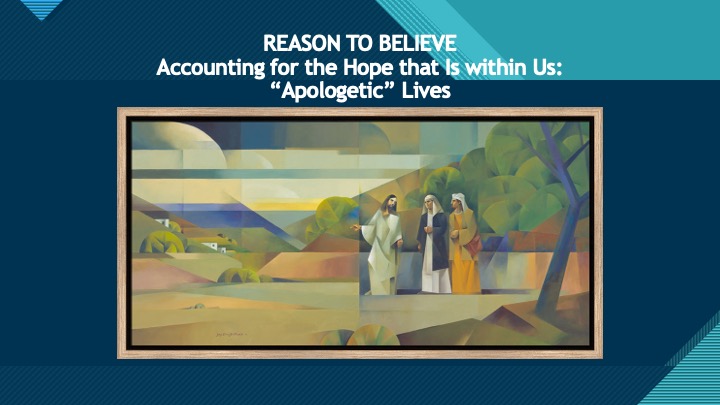
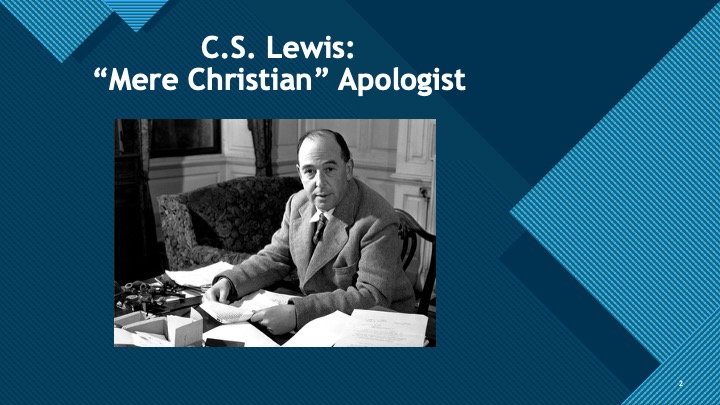
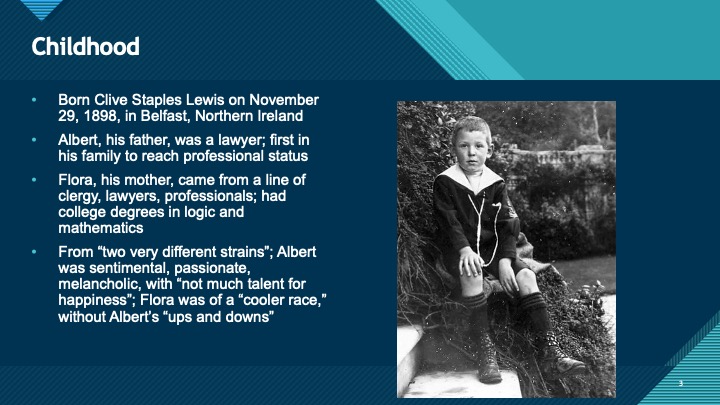
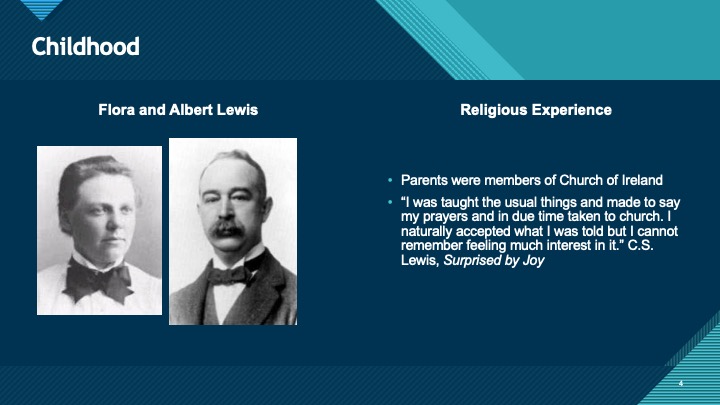
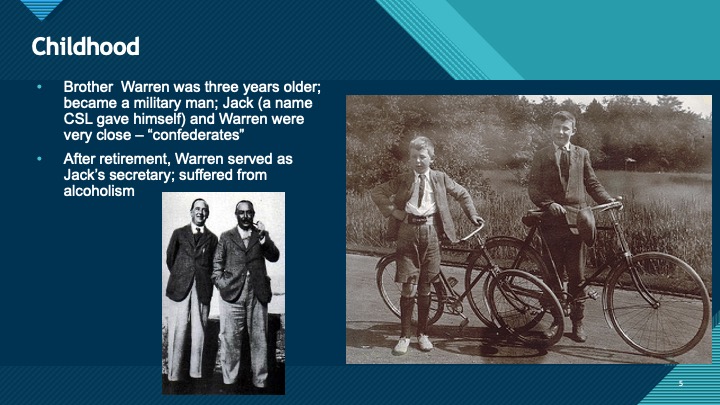
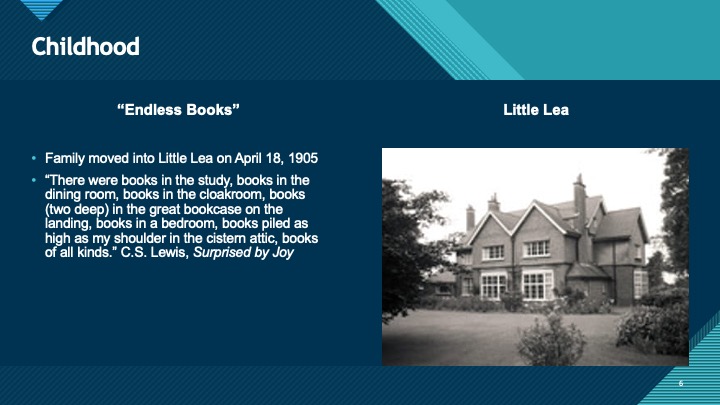
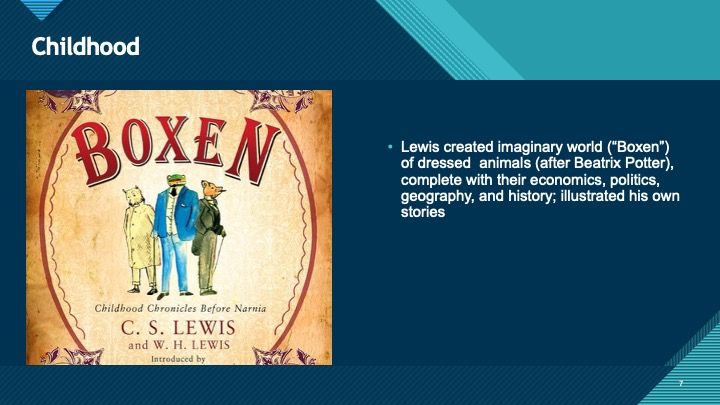
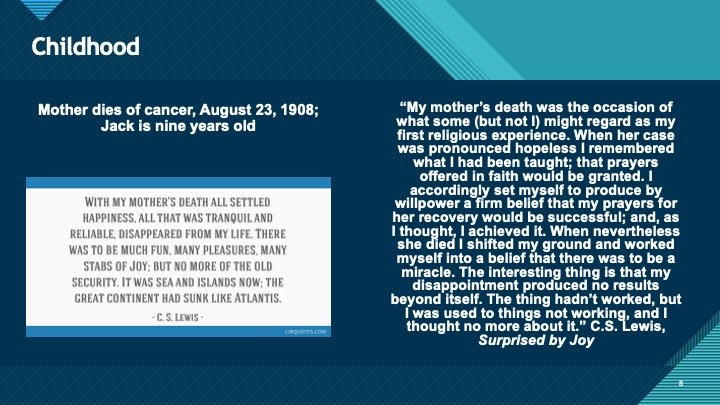
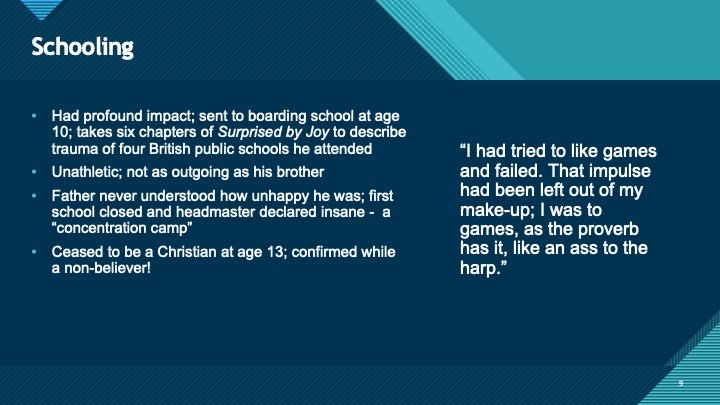
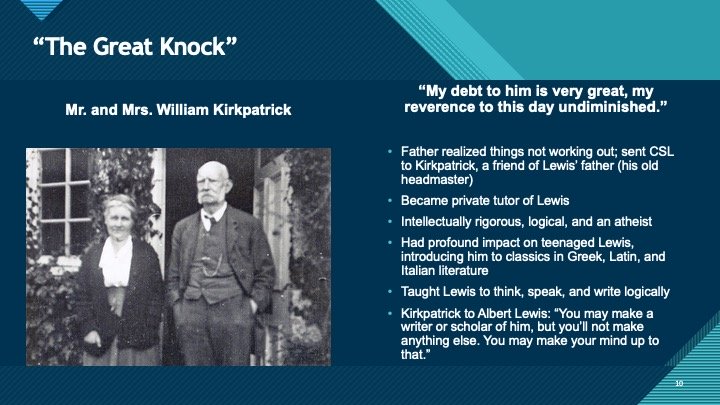
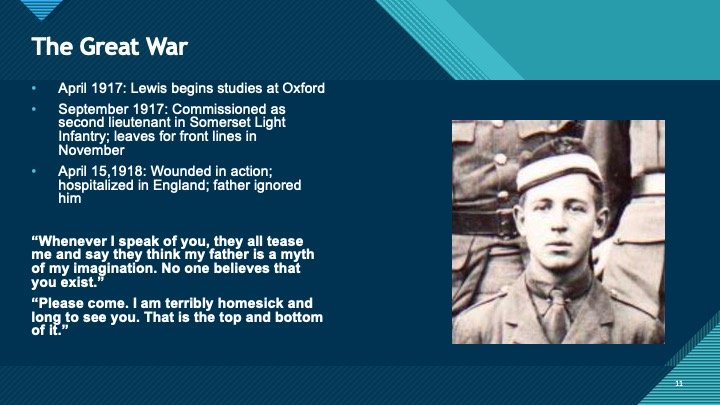
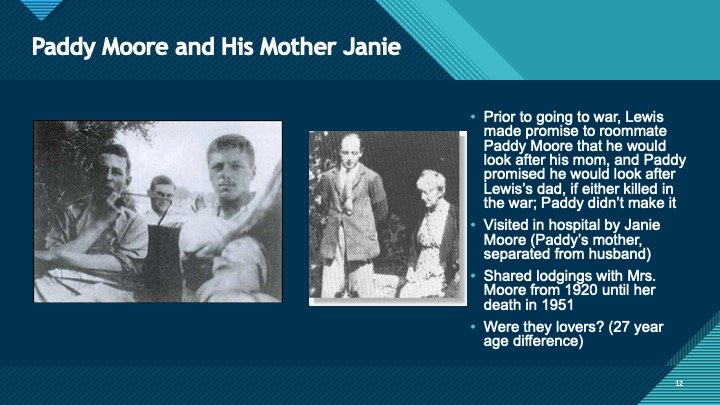
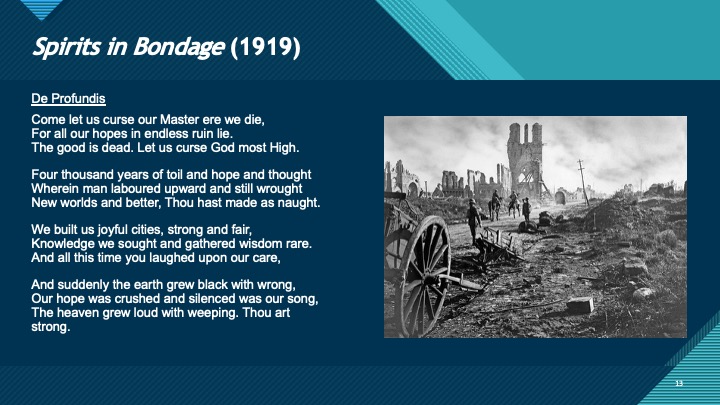
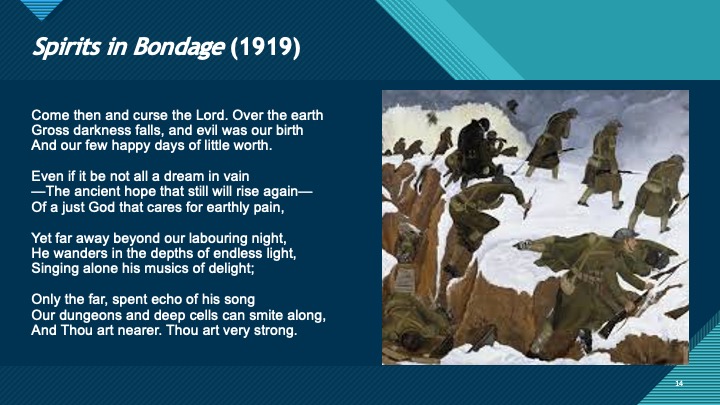
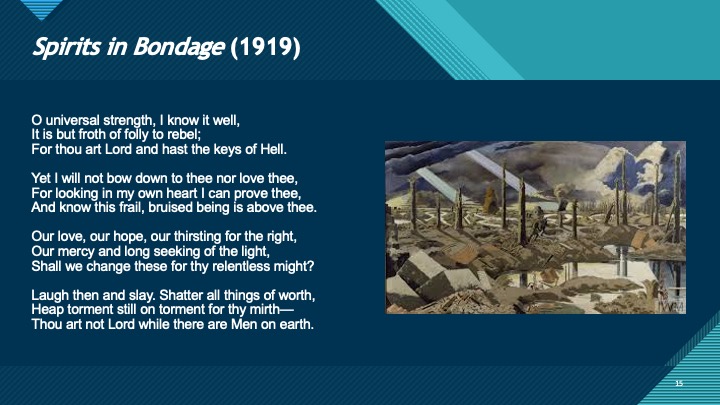
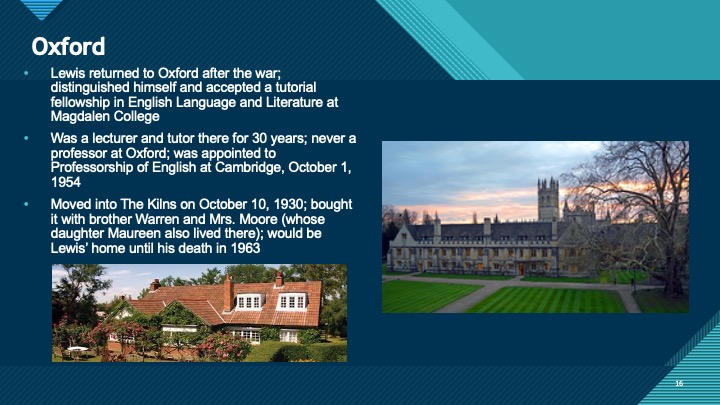
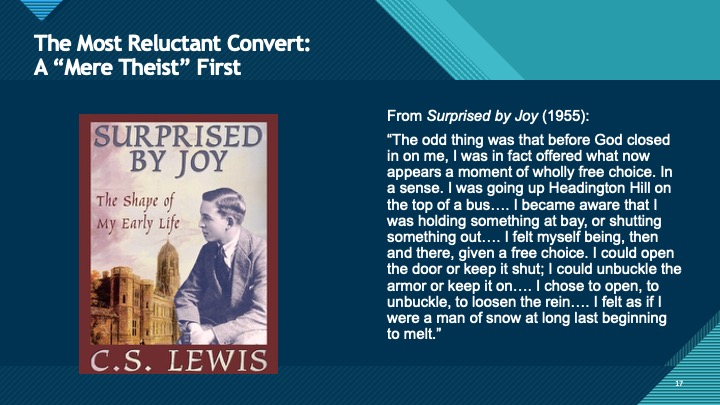
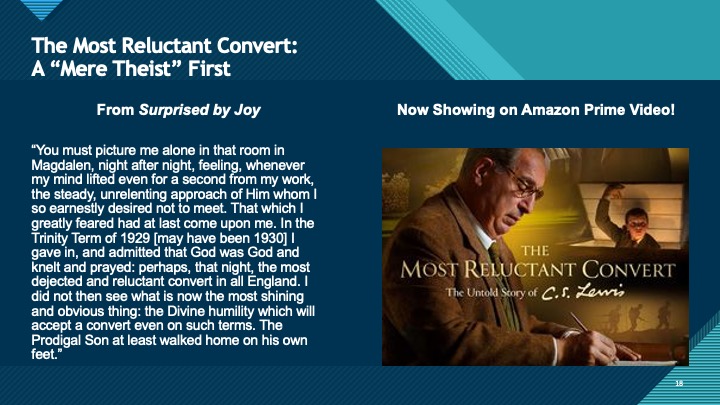
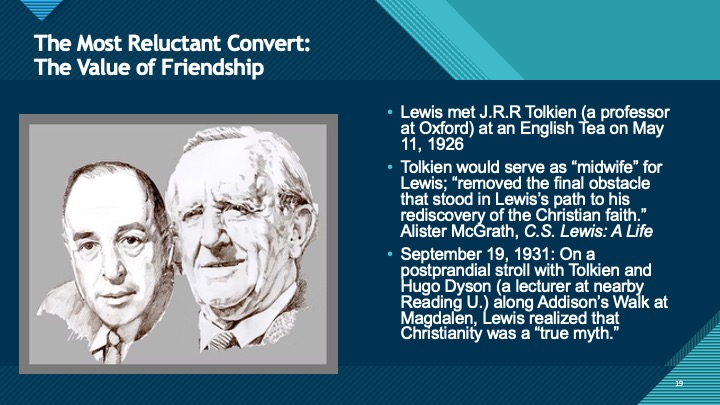
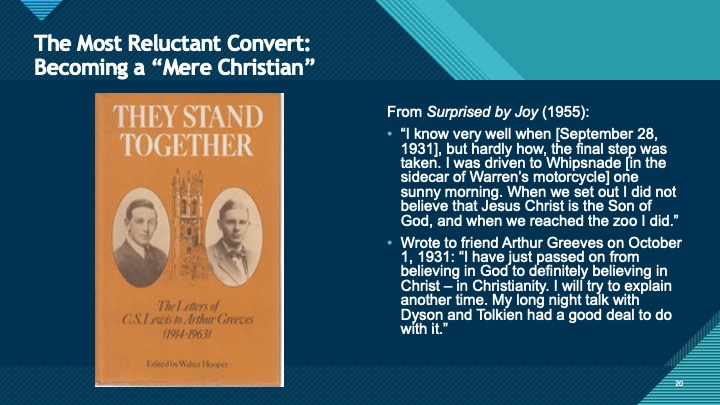
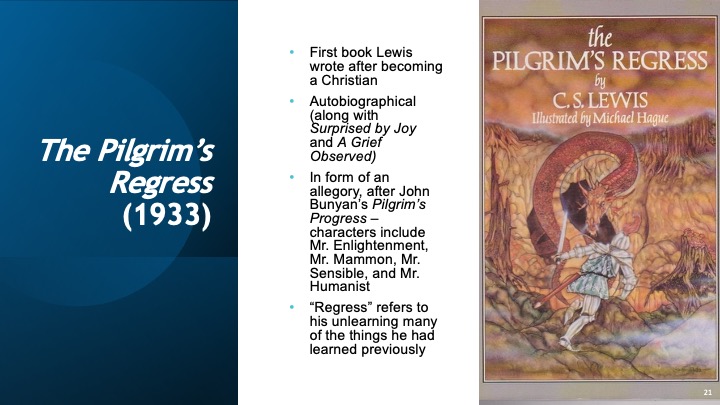
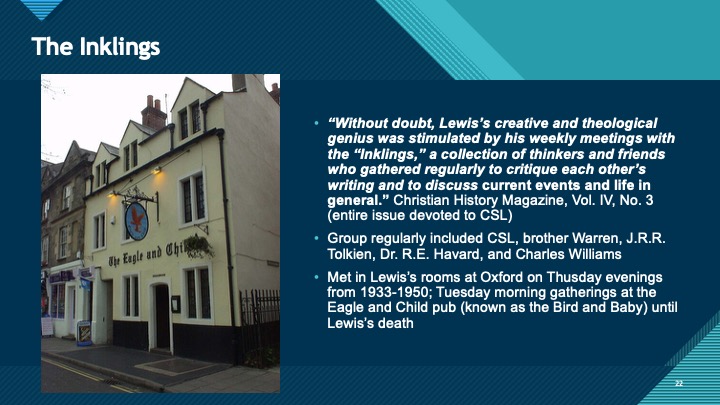
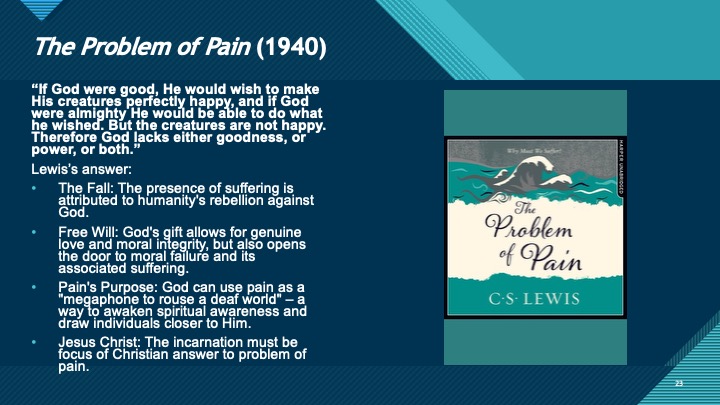
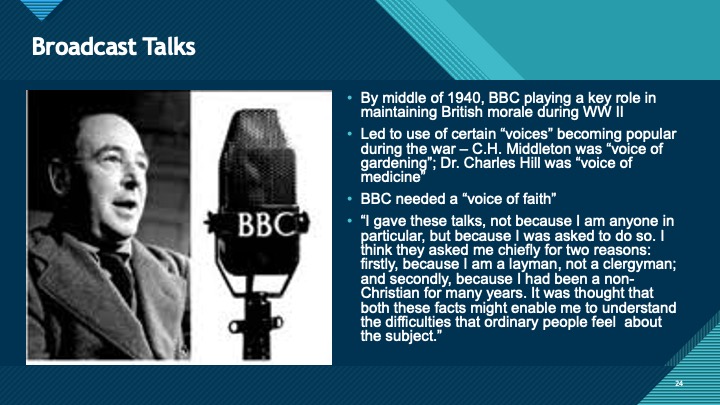
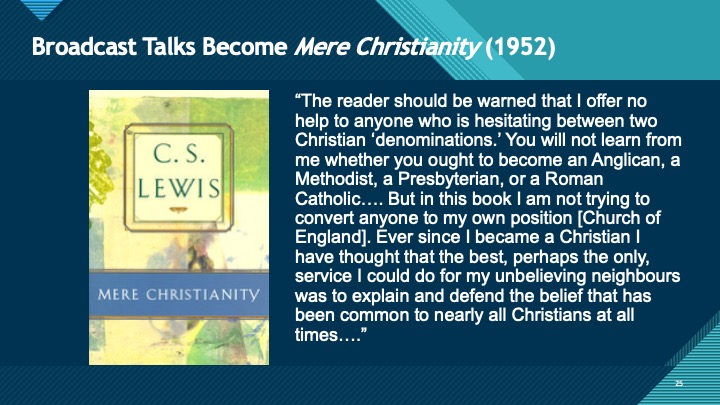
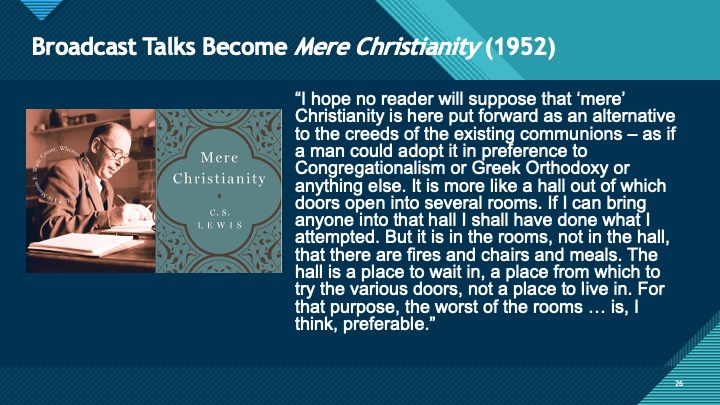
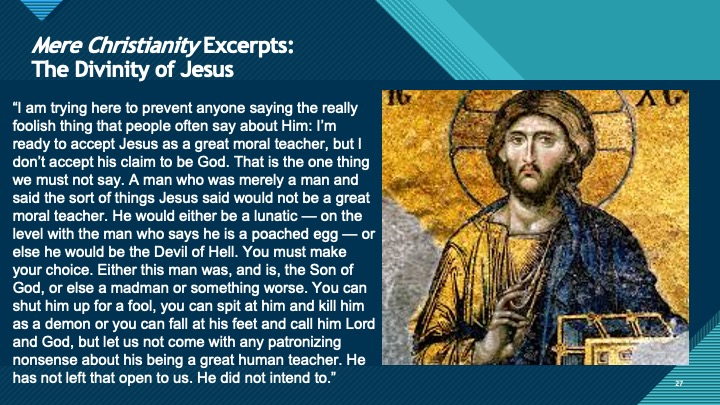
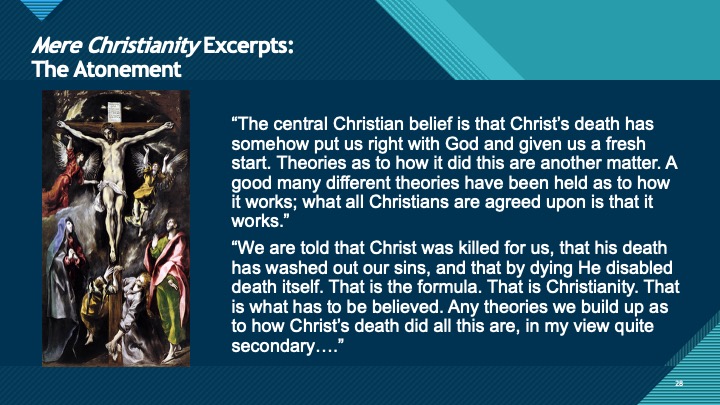
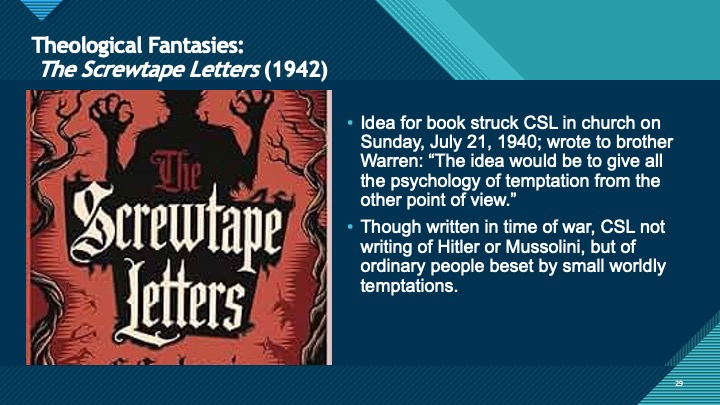
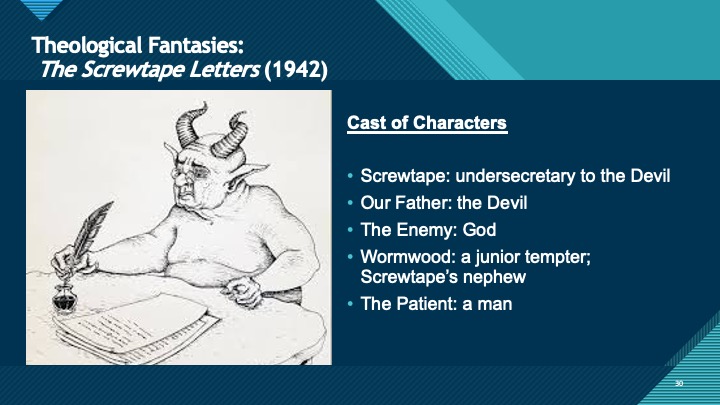
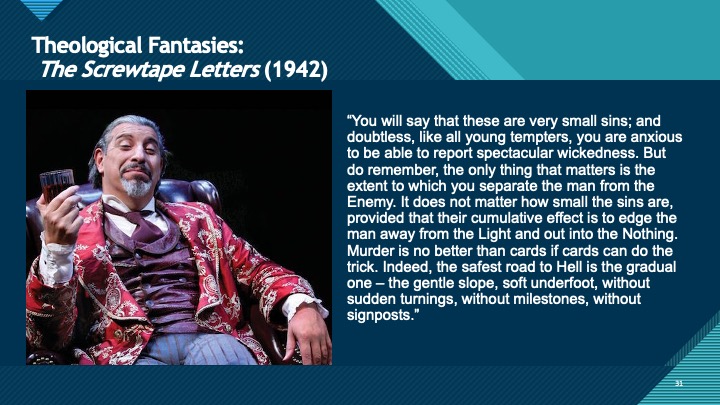
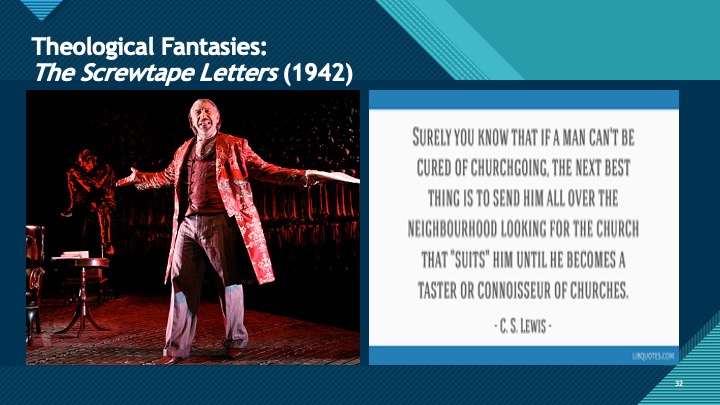
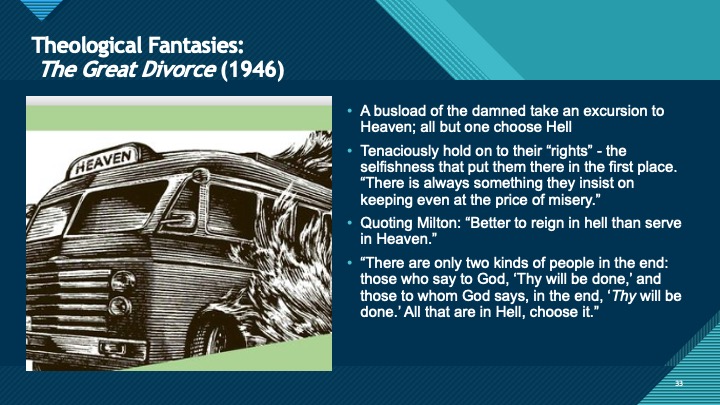
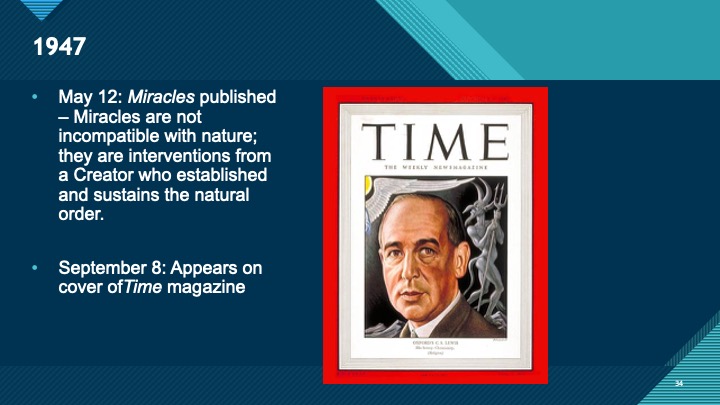
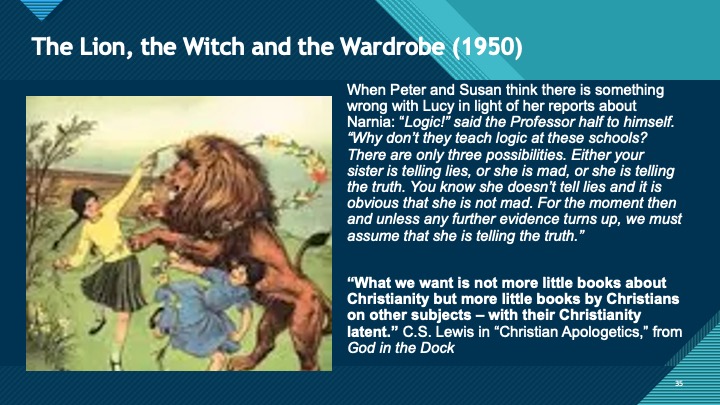
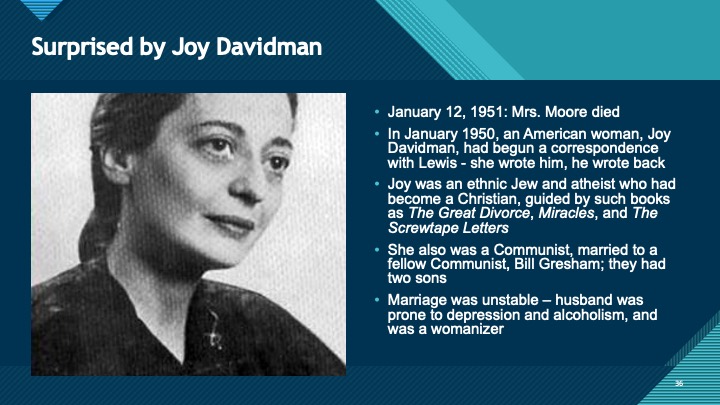
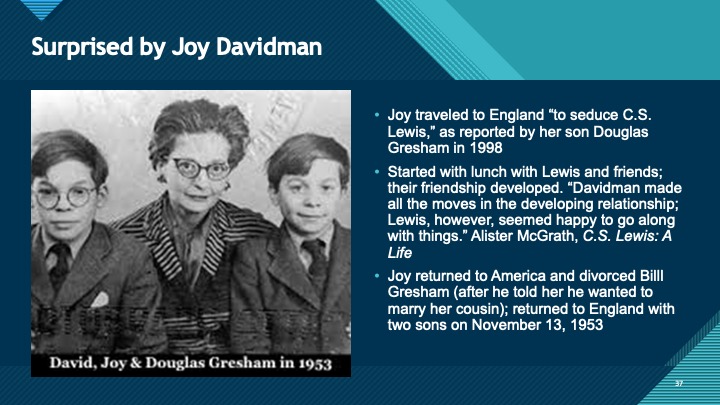
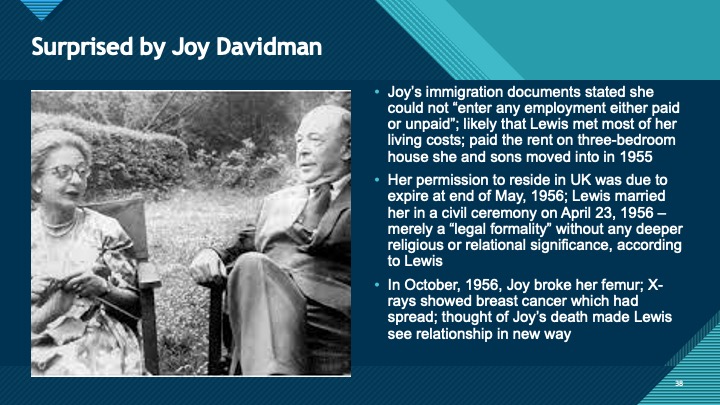
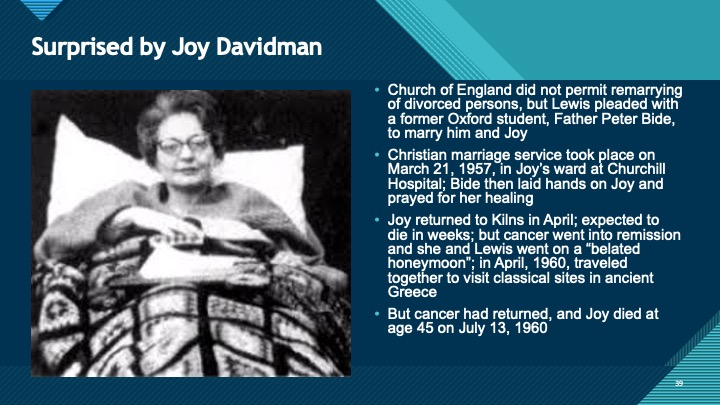
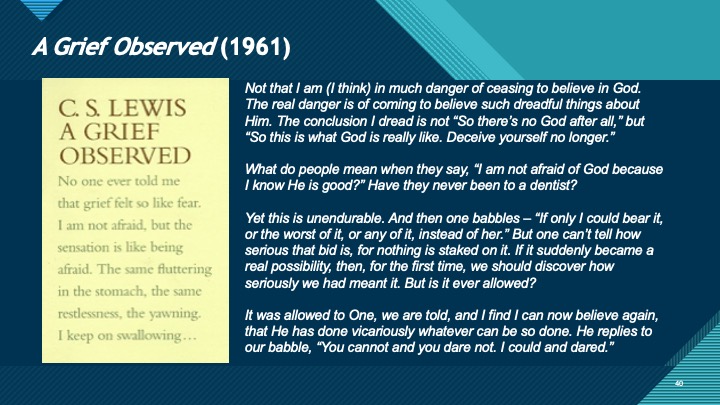
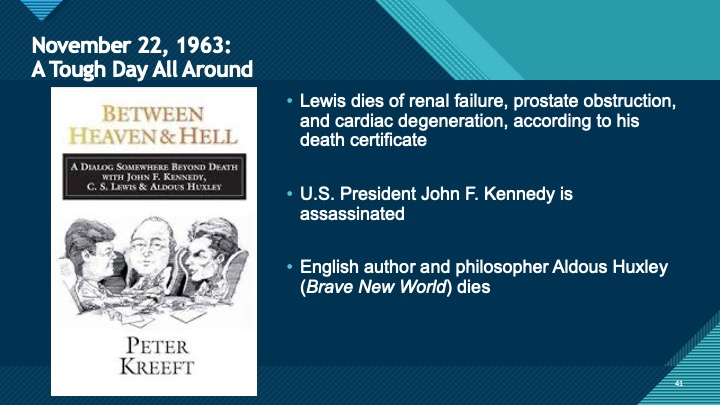
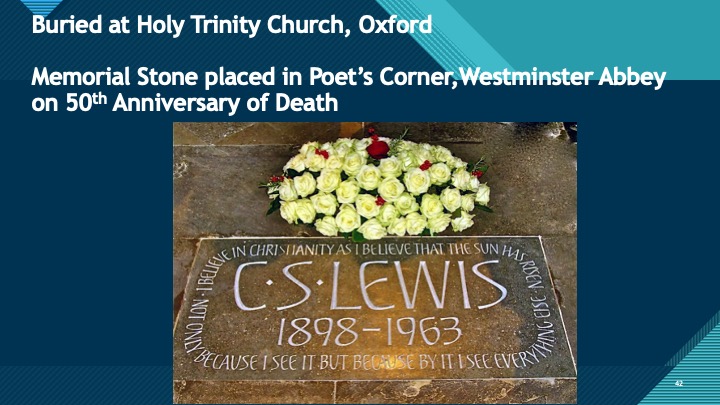
Reason to Believe 10
Links
< Home Page > < Reason to Believe Menu >
Reason to Believe 10 - the Text
REASON TO BELIEVE
Accounting for the Hope that Is within Us:
“Apologetic” Lives
C.S. Lewis:
“Mere Christian” Apologist
Childhood
• Born Clive Staples Lewis on November 29, 1898, in Belfast, Northern Ireland
• Albert, his father, was a lawyer; first in his family to reach professional status
• Flora, his mother, came from a line of clergy, lawyers, professionals; had college degrees in logic and mathematics
• From “two very different strains”; Albert was sentimental, passionate, melancholic, with “not much talent for happiness”; Flora was of a “cooler race,” without Albert’s “ups and downs”
• Religious Experience
• Parents were members of Church of Ireland
• “I was taught the usual things and made to say my prayers and in due time taken to church. I naturally accepted what I was told but I cannot remember feeling much interest in it.” C.S. Lewis, Surprised by Joy
• Brother Warren was three years older; became a military man; Jack (a name CSL gave himself) and Warren were very close – “confederates”
• After retirement, Warren served as Jack’s secretary; suffered from alcoholism
“Endless Books”
• Family moved into Little Lea on April 18, 1905
• “There were books in the study, books in the dining room, books in the cloakroom, books (two deep) in the great bookcase on the landing, books in a bedroom, books piled as high as my shoulder in the cistern attic, books of all kinds.” C.S. Lewis, Surprised by Joy
• Lewis created imaginary world (“Boxen”) of dressed animals (after Beatrix Potter), complete with their economics, politics, geography, and history; illustrated his own stories
• Mother dies of cancer, August 23, 1908; Jack is nine years old
• “My mother’s death was the occasion of what some (but not I) might regard as my first religious experience. When her case was pronounced hopeless I remembered what I had been taught; that prayers offered in faith would be granted. I accordingly set myself to produce by willpower a firm belief that my prayers for her recovery would be successful; and, as I thought, I achieved it. When nevertheless she died I shifted my ground and worked myself into a belief that there was to be a miracle. The interesting thing is that my disappointment produced no results beyond itself. The thing hadn’t worked, but I was used to things not working, and I thought no more about it.” C.S. Lewis, Surprised by Joy
Schooling
• Had profound impact; sent to boarding school at age 10; takes six chapters of Surprised by Joy to describe trauma of four British public schools he attended
• Unathletic; not as outgoing as his brother
• Father never understood how unhappy he was; first school closed and headmaster declared insane - a “concentration camp”
• Ceased to be a Christian at age 13; confirmed while a non-believer!
“The Great Knock”
• Father realized things not working out; sent CSL to Kirkpatrick, a friend of Lewis’ father (his old headmaster)
• Became private tutor of Lewis
• Intellectually rigorous, logical, and an atheist
• Had profound impact on teenaged Lewis, introducing him to classics in Greek, Latin, and Italian literature
• Taught Lewis to think, speak, and write logically
• Kirkpatrick to Albert Lewis: “You may make a writer or scholar of him, but you’ll not make anything else. You may make your mind up to that.”
The Great War
• April 1917: Lewis begins studies at Oxford
• September 1917: Commissioned as second lieutenant in Somerset Light Infantry; leaves for front lines in November
• April 15,1918: Wounded in action; hospitalized in England; father ignored him
“Whenever I speak of you, they all tease me and say they think my father is a myth of my imagination. No one believes that you exist.”
“Please come. I am terribly homesick and long to see you. That is the top and bottom of it.”
Paddy Moore and His Mother Janie
• Prior to going to war, Lewis made promise to roommate Paddy Moore that he would look after his mom, and Paddy promised he would look after Lewis’s dad, if either killed in the war; Paddy didn’t make it
• Visited in hospital by Janie Moore (Paddy’s mother, separated from husband)
• Shared lodgings with Mrs. Moore from 1920 until her death in 1951
• Were they lovers? (27 year age difference)
Spirits in Bondage (1919)
De Profundis
Come let us curse our Master ere we die,
For all our hopes in endless ruin lie.
The good is dead. Let us curse God most High.
Four thousand years of toil and hope and thought
Wherein man laboured upward and still wrought
New worlds and better, Thou hast made as naught.
We built us joyful cities, strong and fair,
Knowledge we sought and gathered wisdom rare.
And all this time you laughed upon our care,
And suddenly the earth grew black with wrong,
Our hope was crushed and silenced was our song,
The heaven grew loud with weeping. Thou art strong.
Come then and curse the Lord. Over the earth
Gross darkness falls, and evil was our birth
And our few happy days of little worth.
Even if it be not all a dream in vain
—The ancient hope that still will rise again—
Of a just God that cares for earthly pain,
Yet far away beyond our labouring night,
He wanders in the depths of endless light,
Singing alone his musics of delight;
Only the far, spent echo of his song
Our dungeons and deep cells can smite along,
And Thou art nearer. Thou art very strong.
O universal strength, I know it well,
It is but froth of folly to rebel;
For thou art Lord and hast the keys of Hell.
Yet I will not bow down to thee nor love thee,
For looking in my own heart I can prove thee,
And know this frail, bruised being is above thee.
Our love, our hope, our thirsting for the right,
Our mercy and long seeking of the light,
Shall we change these for thy relentless might?
Laugh then and slay. Shatter all things of worth,
Heap torment still on torment for thy mirth—
Thou art not Lord while there are Men on earth.
Oxford
• Lewis returned to Oxford after the war; distinguished himself and accepted a tutorial fellowship in English Language and Literature at Magdalen College
• Was a lecturer and tutor there for 30 years; never a professor at Oxford; was appointed to Professorship of English at Cambridge, October 1, 1954
• Moved into The Kilns on October 10, 1930; bought it with brother Warren and Mrs. Moore (whose daughter Maureen also lived there); would be Lewis’ home until his death in 1963
The Most Reluctant Convert:
A “Mere Theist” First
From Surprised by Joy (1955):
“The odd thing was that before God closed in on me, I was in fact offered what now appears a moment of wholly free choice. In a sense. I was going up Headington Hill on the top of a bus…. I became aware that I was holding something at bay, or shutting something out…. I felt myself being, then and there, given a free choice. I could open the door or keep it shut; I could unbuckle the armor or keep it on…. I chose to open, to unbuckle, to loosen the rein…. I felt as if I were a man of snow at long last beginning to melt.”
“You must picture me alone in that room in Magdalen, night after night, feeling, whenever my mind lifted even for a second from my work, the steady, unrelenting approach of Him whom I so earnestly desired not to meet. That which I greatly feared had at last come upon me. In the Trinity Term of 1929 [may have been 1930] I gave in, and admitted that God was God and knelt and prayed: perhaps, that night, the most dejected and reluctant convert in all England. I did not then see what is now the most shining and obvious thing: the Divine humility which will accept a convert even on such terms. The Prodigal Son at least walked home on his own feet.”
The Most Reluctant Convert:
The Value of Friendship
• Lewis met J.R.R Tolkien (a professor at Oxford) at an English Tea on May 11, 1926
• Tolkien would serve as “midwife” for Lewis; “removed the final obstacle that stood in Lewis’s path to his rediscovery of the Christian faith.” Alister McGrath, C.S. Lewis: A Life
• September 19, 1931: On a postprandial stroll with Tolkien and Hugo Dyson (a lecturer at nearby Reading U.) along Addison’s Walk at Magdalen, Lewis realized that Christianity was a “true myth.”
Becoming a “Mere Christian”
From Surprised by Joy (1955):
• “I know very well when [September 28, 1931], but hardly how, the final step was taken. I was driven to Whipsnade [in the sidecar of Warren’s motorcycle] one sunny morning. When we set out I did not believe that Jesus Christ is the Son of God, and when we reached the zoo I did.”
• Wrote to friend Arthur Greeves on October 1, 1931: “I have just passed on from believing in God to definitely believing in Christ – in Christianity. I will try to explain another time. My long night talk with Dyson and Tolkien had a good deal to do with it.”
The Pilgrim’s Regress (1933)
• First book Lewis wrote after becoming a Christian
• Autobiographical (along with Surprised by Joy and A Grief Observed)
• In form of an allegory, after John Bunyan’s Pilgrim’s Progress – characters include Mr. Enlightenment, Mr. Mammon, Mr. Sensible, and Mr. Humanist
• “Regress” refers to his unlearning many of the things he had learned previously
The Inklings
• “Without doubt, Lewis’s creative and theological genius was stimulated by his weekly meetings with the “Inklings,” a collection of thinkers and friends who gathered regularly to critique each other’s writing and to discuss current events and life in general.” Christian History Magazine, Vol. IV, No. 3 (entire issue devoted to CSL)
• Group regularly included CSL, brother Warren, J.R.R. Tolkien, Dr. R.E. Havard, and Charles Williams
• Met in Lewis’s rooms at Oxford on Thusday evenings from 1933-1950; Tuesday morning gatherings at the Eagle and Child pub (known as the Bird and Baby) until Lewis’s death
The Problem of Pain (1940
“If God were good, He would wish to make His creatures perfectly happy, and if God were almighty He would be able to do what he wished. But the creatures are not happy. Therefore God lacks either goodness, or power, or both.”
Lewis’s answer:
• The Fall: The presence of suffering is attributed to humanity's rebellion against God.
• Free Will: God's gift allows for genuine love and moral integrity, but also opens the door to moral failure and its associated suffering.
• Pain's Purpose: God can use pain as a "megaphone to rouse a deaf world" – a way to awaken spiritual awareness and draw individuals closer to Him.
• Jesus Christ: The incarnation must be focus of Christian answer to problem of pain.
Broadcast Talks
• By middle of 1940, BBC playing a key role in maintaining British morale during WW II
• Led to use of certain “voices” becoming popular during the war – C.H. Middleton was “voice of gardening”; Dr. Charles Hill was “voice of medicine”
• BBC needed a “voice of faith”
• “I gave these talks, not because I am anyone in particular, but because I was asked to do so. I think they asked me chiefly for two reasons: firstly, because I am a layman, not a clergyman; and secondly, because I had been a non-Christian for many years. It was thought that both these facts might enable me to understand the difficulties that ordinary people feel about the subject.”
Broadcast Talks Become Mere Christianity (1952)
“The reader should be warned that I offer no help to anyone who is hesitating between two Christian ‘denominations.’ You will not learn from me whether you ought to become an Anglican, a Methodist, a Presbyterian, or a Roman Catholic…. But in this book I am not trying to convert anyone to my own position [Church of England]. Ever since I became a Christian I have thought that the best, perhaps the only, service I could do for my unbelieving neighbours was to explain and defend the belief that has been common to nearly all Christians at all times….”
“I hope no reader will suppose that ‘mere’ Christianity is here put forward as an alternative to the creeds of the existing communions – as if a man could adopt it in preference to Congregationalism or Greek Orthodoxy or anything else. It is more like a hall out of which doors open into several rooms. If I can bring anyone into that hall I shall have done what I attempted. But it is in the rooms, not in the hall, that there are fires and chairs and meals. The hall is a place to wait in, a place from which to try the various doors, not a place to live in. For that purpose, the worst of the rooms … is, I think, preferable.”
Mere Christianity Excerpts:
The Divinity of Jesus
“I am trying here to prevent anyone saying the really foolish thing that people often say about Him: I’m ready to accept Jesus as a great moral teacher, but I don’t accept his claim to be God. That is the one thing we must not say. A man who was merely a man and said the sort of things Jesus said would not be a great moral teacher. He would either be a lunatic — on the level with the man who says he is a poached egg — or else he would be the Devil of Hell. You must make your choice. Either this man was, and is, the Son of God, or else a madman or something worse. You can shut him up for a fool, you can spit at him and kill him as a demon or you can fall at his feet and call him Lord and God, but let us not come with any patronizing nonsense about his being a great human teacher. He has not left that open to us. He did not intend to.”
The Atonement
“The central Christian belief is that Christ’s death has somehow put us right with God and given us a fresh start. Theories as to how it did this are another matter. A good many different theories have been held as to how it works; what all Christians are agreed upon is that it works.”
“We are told that Christ was killed for us, that his death has washed out our sins, and that by dying He disabled death itself. That is the formula. That is Christianity. That is what has to be believed. Any theories we build up as to how Christ’s death did all this are, in my view quite secondary….”
Theological Fantasies:
The Screwtape Letters (1942)
• Idea for book struck CSL in church on Sunday, July 21, 1940; wrote to brother Warren: “The idea would be to give all the psychology of temptation from the other point of view.”
• Though written in time of war, CSL not writing of Hitler or Mussolini, but of ordinary people beset by small worldly temptations.
Cast of Characters
• Screwtape: undersecretary to the Devil
• Our Father: the Devil
• The Enemy: God
• Wormwood: a junior tempter; Screwtape’s nephew
• The Patient: a man
• “You will say that these are very small sins; and doubtless, like all young tempters, you are anxious to be able to report spectacular wickedness. But do remember, the only thing that matters is the extent to which you separate the man from the Enemy. It does not matter how small the sins are, provided that their cumulative effect is to edge the man away from the Light and out into the Nothing. Murder is no better than cards if cards can do the trick. Indeed, the safest road to Hell is the gradual one – the gentle slope, soft underfoot, without sudden turnings, without milestones, without signposts.”
Theological Fantasies:
The Great Divorce (1946)
• A busload of the damned take an excursion to Heaven; all but one choose Hell
• Tenaciously hold on to their “rights” - the selfishness that put them there in the first place. “There is always something they insist on keeping even at the price of misery.”
• Quoting Milton: “Better to reign in hell than serve in Heaven.”
• “There are only two kinds of people in the end: those who say to God, ‘Thy will be done,’ and those to whom God says, in the end, ‘Thy will be done.’ All that are in Hell, choose it.”
1947
• May 12: Miracles published – Miracles are not incompatible with nature; they are interventions from a Creator who established and sustains the natural order.
• September 8: Appears on cover ofTime magazine
The Lion, the Witch and the Wardrobe (1950)
When Peter and Susan think there is something wrong with Lucy in light of her reports about Narnia: “Logic!” said the Professor half to himself. “Why don’t they teach logic at these schools? There are only three possibilities. Either your sister is telling lies, or she is mad, or she is telling the truth. You know she doesn’t tell lies and it is obvious that she is not mad. For the moment then and unless any further evidence turns up, we must assume that she is telling the truth.”
“What we want is not more little books about Christianity but more little books by Christians on other subjects – with their Christianity latent.” C.S. Lewis in “Christian Apologetics,” from God in the Dock
Surprised by Joy Davidman
• January 12, 1951: Mrs. Moore died
• In January 1950, an American woman, Joy Davidman, had begun a correspondence with Lewis - she wrote him, he wrote back
• Joy was an ethnic Jew and atheist who had become a Christian, guided by such books as The Great Divorce, Miracles, and The Screwtape Letters
• She also was a Communist, married to a fellow Communist, Bill Gresham; they had two sons
• Marriage was unstable – husband was prone to depression and alcoholism, and was a womanizer
• Joy traveled to England “to seduce C.S. Lewis,” as reported by her son Douglas Gresham in 1998
• Started with lunch with Lewis and friends; their friendship developed. “Davidman made all the moves in the developing relationship; Lewis, however, seemed happy to go along with things.” Alister McGrath, C.S. Lewis: A Life
• Joy returned to America and divorced Billl Gresham (after he told her he wanted to marry her cousin); returned to England with two sons on November 13, 1953
• Joy’s immigration documents stated she could not “enter any employment either paid or unpaid”; likely that Lewis met most of her living costs; paid the rent on three-bedroom house she and sons moved into in 1955
• Her permission to reside in UK was due to expire at end of May, 1956; Lewis married her in a civil ceremony on April 23, 1956 – merely a “legal formality” without any deeper religious or relational significance, according to Lewis
• In October, 1956, Joy broke her femur; X-rays showed breast cancer which had spread; thought of Joy’s death made Lewis see relationship in new way
• Church of England did not permit remarrying of divorced persons, but Lewis pleaded with a former Oxford student, Father Peter Bide, to marry him and Joy
• Christian marriage service took place on March 21, 1957, in Joy’s ward at Churchill Hospital; Bide then laid hands on Joy and prayed for her healing
• Joy returned to Kilns in April; expected to die in weeks; but cancer went into remission and she and Lewis went on a “belated honeymoon”; in April, 1960, traveled together to visit classical sites in ancient Greece
• But cancer had returned, and Joy died at age 45 on July 13, 1960
A Grief Observed (1961)
Not that I am (I think) in much danger of ceasing to believe in God. The real danger is of coming to believe such dreadful things about Him. The conclusion I dread is not “So there’s no God after all,” but “So this is what God is really like. Deceive yourself no longer.”
What do people mean when they say, “I am not afraid of God because I know He is good?” Have they never been to a dentist?
Yet this is unendurable. And then one babbles – “If only I could bear it, or the worst of it, or any of it, instead of her.” But one can’t tell how serious that bid is, for nothing is staked on it. If it suddenly became a real possibility, then, for the first time, we should discover how seriously we had meant it. But is it ever allowed?
It was allowed to One, we are told, and I find I can now believe again, that He has done vicariously whatever can be so done. He replies to our babble, “You cannot and you dare not. I could and dared.”
November 22, 1963:
A Tough Day All Around
• Lewis dies of renal failure, prostate obstruction, and cardiac degeneration, according to his death certificate
• U.S. President John F. Kennedy is assassinated
• English author and philosopher Aldous Huxley (Brave New World) dies
Buried at Holy Trinity Church, Oxford
Memorial Stone placed in Poet’s Corner,Westminster Abbey on 50th
Anniversary of Death